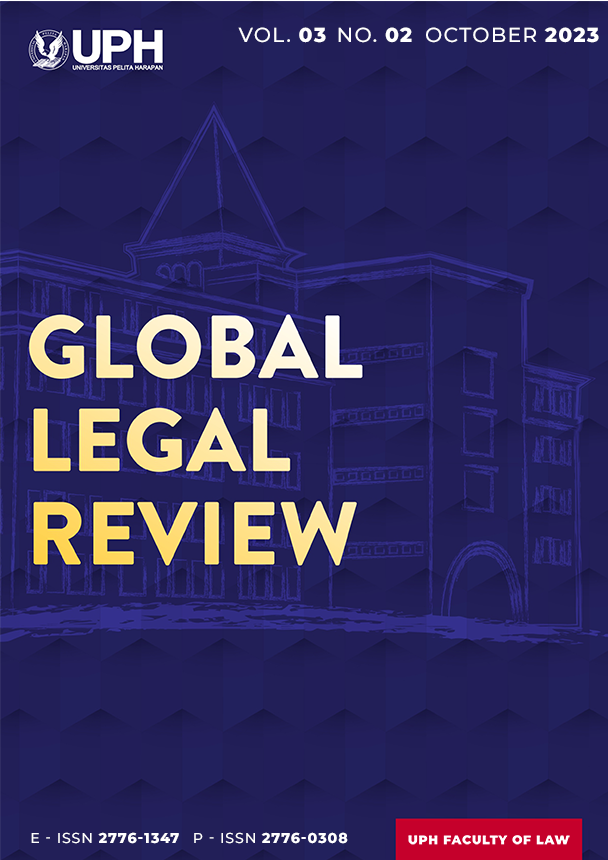Curators are Vulnerable to be Criminalized and Criminated in Bankruptcy and PKPU Processes
DOI:
https://doi.org/10.19166/glr.v3i2.7424Keywords:
Curator, Bankruptcy and PKPU, Criminal LiabilityAbstract
The Curator is one of the important organs in the debt settlement process between debtors and their creditors through bankruptcy law instruments. Based on Law Number 37 of 2004 concerning Bankruptcy and Postponement of Debt Payment Obligations (PKPU), the Curator is given broad and broad duties and powers in managing and settling the assets of a bankrupt debtor. Because since being declared bankrupt by the court, the debtor has lost his right to manage his business and assets. The duties and authorities to administer the business and assets of the bankrupt debtor rest in the hands of the Curator, who works under the supervision of the Supervisory Judge. In carrying out its duties and authorities, the Curator must adhere to the provisions of the Law and the Professional Code of Ethics, namely being independent, having no conflict of interest and not handling more than 3 (three) Bankruptcy and PKPU cases. If in carrying out its duties and authorities it causes damage to the bankrupt assets, then the Curator must be legally responsible. That means, the Curator does not have the right of immunity or impunity in carrying out his duties and authorities to manage and settle bankruptcy assets in accordance with the provisions of the law. The Curator is not a public official. The Curator may be punished if his actions and decisions in administering and settling the bankrupt assets cause harm to the bankrupt assets. However, Law Number 37 of 2004 concerning Bankruptcy and PKPU does not include criteria for criminal acts and criminal sanctions for Curators. Because of this, Curators are vulnerable to being criminalized and punished.
The Curator is one of the important organs in the debt settlement process between debtors and their creditors through bankruptcy law instruments. Based on Law Number 37 of 2004 concerning Bankruptcy and Postponement of Debt Payment Obligations (PKPU), the Curator is given broad and broad duties and powers in managing and settling the assets of a bankrupt debtor. Because since being declared bankrupt by the court, the debtor has lost his right to manage his business and assets. The duties and authorities to administer the business and assets of the bankrupt debtor rest in the hands of the Curator, who works under the supervision of the Supervisory Judge. In carrying out its duties and authorities, the Curator must adhere to the provisions of the Law and the Professional Code of Ethics, namely being independent, having no conflict of interest and not handling more than 3 (three) Bankruptcy and PKPU cases. If in carrying out its duties and authorities it causes damage to the bankrupt assets, then the Curator must be legally responsible. That means, the Curator does not have the right of immunity or impunity in carrying out his duties and authorities to manage and settle bankruptcy assets in accordance with the provisions of the law. The Curator is not a public official. The Curator may be punished if his actions and decisions in administering and settling the bankrupt assets cause harm to the bankrupt assets. However, Law Number 37 of 2004 concerning Bankruptcy and PKPU does not include criteria for criminal acts and criminal sanctions for Curators. Because of this, Curators are vulnerable to being criminalized and punished.
References
Adhitia, Fitang Budhi. “Tangani Aset Rp 1 Triliun, 3 Kurator Ditangkap Bareskrim.” Detiknews, May 19, 2017. https://news.detik.com/berita/d-3506327/tangani-aset-rp-.
Aprita, Serlika. “Wewenang Dan Tanggung Jawab Hukum Kurator Atas Kesalahan Atau Kelalaiannya Mengakibatkan Kerugian Bagi Debitor Dalam Proses Hukum Pengurusan Dan Pemberesan Harta Pailit.” Solusi 17, no. 2 (2019): 154–174. https://doi.org/10.36546/solusi.v17i2.173.
Astiti, Sriti Hesti. "Pertanggungjawaban Pidana Kurator Berdasarkan Prinsip Independensi Menurut Hukum Kepailitan." Jurnal Hukum dan Peradilan 5, no. 2 (2016): 277–298. https://doi.org/10.25216/jhp.5.2.2016.277-298.
Ginting, Elita Ras. Hukum Kepailitan: Teori Kepailitan. Jakarta: Penerbit Sinar Grafika, 2018.
Luthan, Salman. "Dialektika Hukum Dan Moral Dalam Perspektif Filsafat Hukum." Jurnal Hukum Ius Quia Iustum 19, no. 4 (October 2012): 506–523. https://doi.org/10.20885/iustum.vol19.iss4.art2.
Redaksi Media Merah Putih. “Dua Kurator Rochmad Dan Wahid Dituntut 3 Tahun Penjara Terkait Pemalsuan.” Media Merah Putih, March 17, 2023. https://mediamerahputih.id/dua-kurator-rochmad-dan-wahid-dituntut-3-tahun-penjara-terkait-pemalsuan/.
Shubhan, M. Hadi. Hukum Kepailitan: Prinsip, Norma, dan Praktik di Peradilan. Jakarta: Kencana Prenada Media Group, 2008.
Soekanto, Soerjono. Pengantar Penelitian Hukum. Jakarta: Universitas Indonesia, 1986.
Winarto, Yudho. “Batavia Air Pidanakan Tim Kurator Soal Aset.” Kontan.co.id., November 20, 2015. https://nasional.kontan.co.id/news/batavia-air-pidanakan-tim-kurator-soal-asset.
Yalid. “Requirements and Prospects and the Idea of Immunity Against Good Faith Curators.” Respublica Law Journal 16, no. 1 (2016).
Downloads
Published
How to Cite
Issue
Section
License
Copyright (c) 2023 Ranto Parulian Simanjuntak

This work is licensed under a Creative Commons Attribution-ShareAlike 4.0 International License.
Authors who publish with this journal agree to the following terms:
1) Authors retain copyright and grant the journal right of first publication with the work simultaneously licensed under a Creative Commons Attribution License (CC-BY-SA 4.0) that allows others to share the work with an acknowledgement of the work's authorship and initial publication in this journal.
2) Authors are able to enter into separate, additional contractual arrangements for the non-exclusive distribution of the journal's published version of the work (e.g., post it to an institutional repository or publish it in a book), with an acknowledgement of its initial publication in this journal.
3) Authors are permitted and encouraged to post their work online (e.g., in institutional repositories or on their website). The final published PDF should be used and bibliographic details that credit the publication in this journal should be included.

